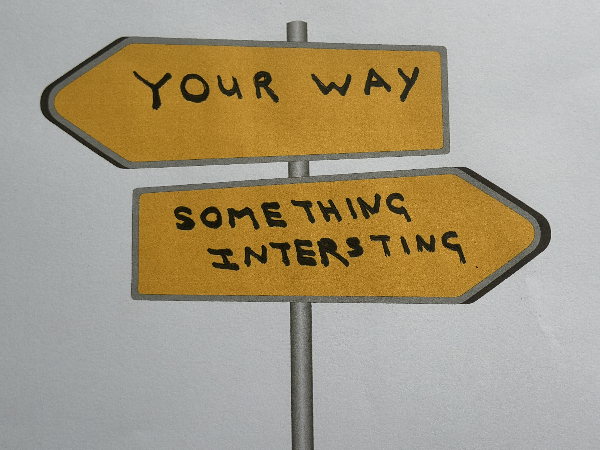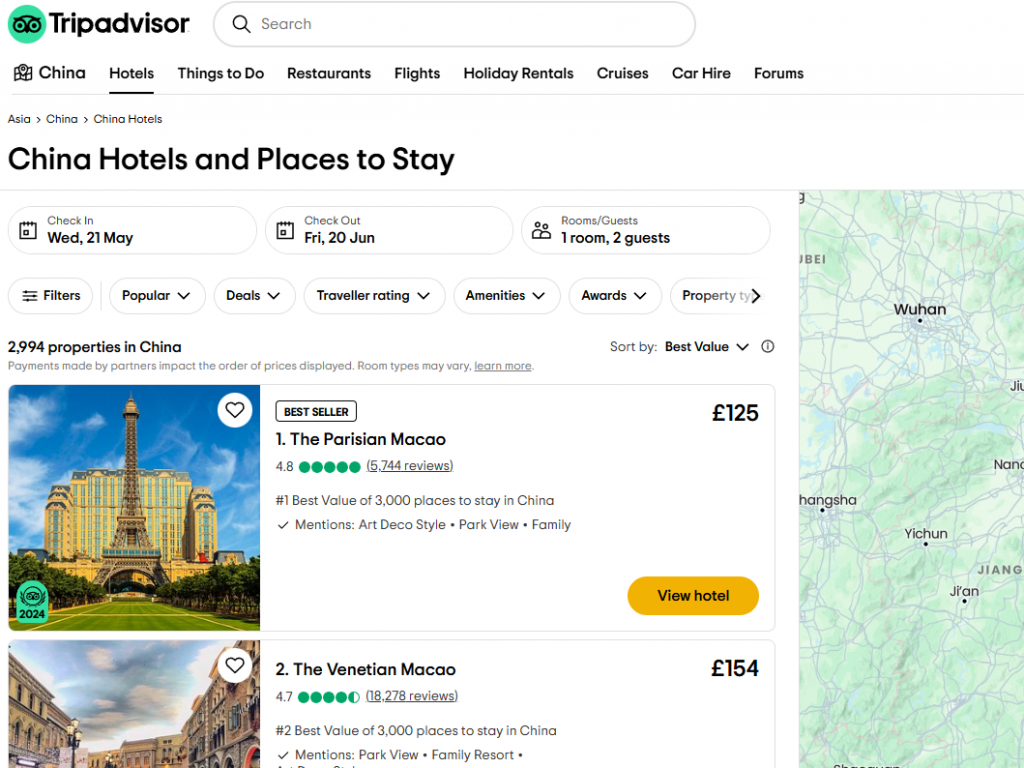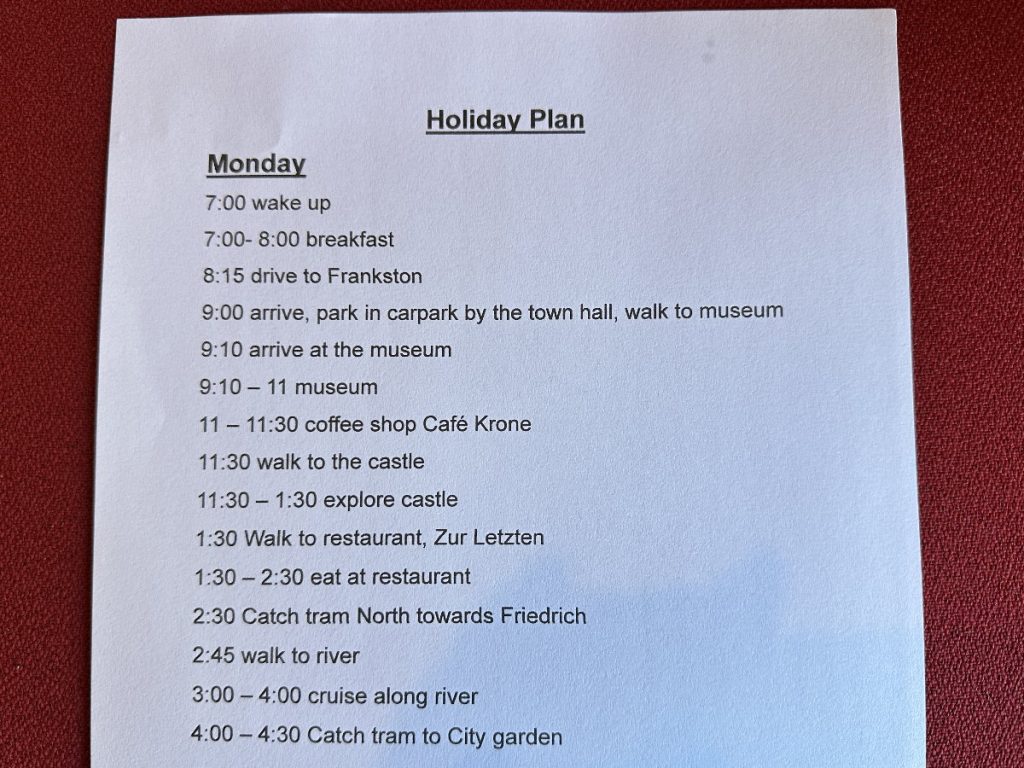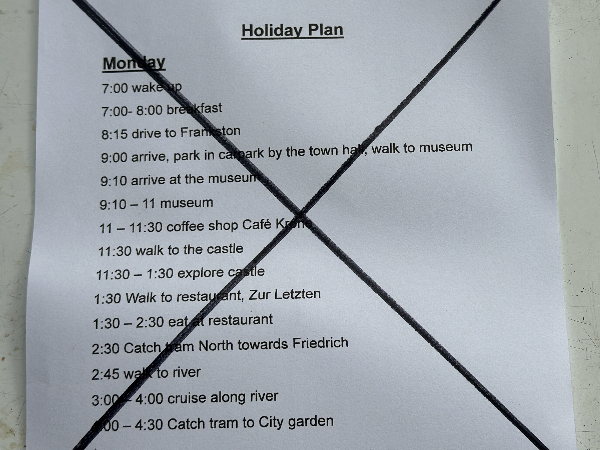When we first started going on holidays, we didn’t have many resources to plan a holiday. We pored over maps and looked at a few books borrowed from the library; we didn’t have the internet.
We bought Interrail tickets for a trip around Europe. Then, we spent an evening looking at a map, choosing places to visit, planning a route, and deciding when to go. Planning for a month’s holiday took one evening. There was no looking at reviews or prebooking accommodation.
When we arrived at our destinations, we walked to the local YHA, which was only full once. We spent our days exploring and randomly finding places.
Fast-forward many years, and I have become a planner. I plan every detail of our holidays. My sister thinks this is funny and asks me if I have planned when I will have my toilet breaks and which cubicle I plan to use.
But which type of holiday is best, one that is planned in every detail or one where you just go with the flow? Planners and go-with-the-flow types both think their ways are best. So, who is right? Which type are you?
How much time do you spend planning?

A survey conducted a few years ago found that the average person spent 10 hours planning their holiday, although most people got bored within the first hour. Planning their holidays was a major stress factor for ¼ of the people surveyed. Yet many people go to great lengths to plan every aspect of their holiday.
A serious planner
A serious planner will plan everything from when they depart until they return. They will know how to use public transport, which bus or train they need, which places they will visit and on which day. They will also know where the restaurants are and which one they are going to use.
They will even have a backup plan if the weather spoils plan A. The accommodation will only be booked after hours of poring over reviews.
Each attraction on the plan would have been researched in detail and weighed against all available options. Planning takes more than 10 hours and can go on for weeks.
Advantages of planning

- You won’t miss something. After driving back through France, I discovered we had driven very near Lourdes, a place I would have liked to see. I could have easily stopped if I had only known it was nearby. It was after this trip that I started to become a planner.
- You can pre-book. Nowadays, many attractions require advance booking. You won’t know about this unless you do some research.

- You can find out what an attraction is like. By researching sites like TripAdvisor, you can decide if it is worth putting on your sightseeing itinerary. Some attractions are boring or not something you would enjoy. If you knew beforehand, you wouldn’t waste your time or money. You can find out other information that might be useful. On a recent holiday in Spain, on a map, I found a free car park at the back entrance of an attraction. When we arrived at the attraction, cars were parked on the road, in every available space, and the first two car parks were full. The car park at the back entrance was almost empty and didn’t cost a thing. Not many people realised the car park was there, or they would have used it, and it was a lot closer than those who parked on the road.

- You can find out the opening hours. I have heard many stories of people going somewhere and finding it closed. Some friends drove several hours to visit a castle, only to find it was closed that afternoon. Someone else I knew was going to see the Vatican for a long weekend. However, they didn’t check up, and there was a special event one day, which meant they couldn’t visit then. Their two days exploring the Vatican became one day.
- Planning saves you time. I know people who go on holiday and spend their first morning finding out what to see locally, and then decide what to see. I prefer to do this before I leave home, so I can start exploring immediately instead of wasting a morning. You can also save time by knowing where things are, such as a good restaurant or two attractions close together, that you can visit in one day rather than two separate trips. I hated walking around a town, starving, trying to find a nice restaurant.
- Finding details of the local transport. Researching buses and trains can seem a bit of an effort, but if they only run every hour, you can do something better than waiting at a bus stop.Or you might find out that the last bus leaves at 23:30, so you go to an earlier show.
- It will be less haphazard. Things work out better when a little thought has gone into planning. If you want to go on something that is weather-dependent, e.g., whale spotting, book it for the beginning of the week. If it gets cancelled, you can still go later in the week. By planning and looking at the weather forecast, you can go to the water park on a sunny day and to the museum when wet.
- You can tell if your plans are realistic. I used to cram too much into the last day and often have a mad rush to the port or airport. Now that I plan better, I know what I can realistically achieve on that last day.
- Avoid breaking the law. Before I went to Budapest, I discovered that many tourists get into trouble because they don’t scan their bus or train station tickets at the start of their journeys. They presume that because they have brought a ticket, everything is okay, but they have to pay a fine because their ticket wasn’t validated. You might not be aware that some things are illegal, such as sitting on the Spanish steps in Rome or driving in a city centre where you can only drive with a pass. If you get caught, you will get a fine; tourists don’t get let off just because they didn’t know.
- It can be reassuring. If you are a bit nervous or worried about something, then some research can help allay your fears. Before I pick up a hire car and drive in a foreign country, I like to look at a Google map and see what the roads look like for the first few miles. This gives me confidence while I drive a strange car, often on the opposite side from what I am used to.
Disadvantages of planning
- It is very time-consuming. Finding all the information you need to make a good plan takes a long time. For some people, planning is fun and part of the looking-forward process. Even I, a serial planner, sometimes get fed up with it.

- Becoming fixated on the set timetable. The worst problem is when a planner gets too fixated on their plan and doesn’t like it if people don’t follow it. If their plan says they must leave home by 8:30, they get cross if everybody is not ready until 8:35. Working on a strict timetable isn’t very relaxing.
- No spontaneity. Having planned everything out, there is no spontaneity, no chance to investigate something a local recommends and no excitement as you rarely discover something for yourself.
The no-plan, go-with-the-flow holiday
- It is relaxing. Without any plans, you can get up whenever you want in the morning and wander down to the beach or around the town and see what turns up. No timetables, no schedules, you have come on holiday to relax, you have enough stress and deadlines to meet at work.
- Free Time. If you spot something interesting, you have time to investigate it. You don’t have somewhere else to rush off to. You can spend as much time as you like in a museum or have a long lunch if you want to.
- Experience the excitement of discovering something. Discovering an interesting place yourself is far more exciting than following someone’s instructions. If you find a secluded beach, it feels extra special; it is your secret.
- You can find things not in a tourist book. When we randomly wandered around the narrow streets of Havana, we came across an elderly woman dancing in the street. The sheer joy on the woman’s face and the perfect dance movements were more entertaining than anything in the tourist book.
- You notice more. If you are not rushing about, you notice more. You can spend your time people-watching, which is one of my favourite things to do.
Disadvantages of not planning

- Wasting time. You can spend a lot of time on holiday not doing much, you could be queuing in a tourist office waiting to find what attractions there are, waiting for a bus for an hour or driving to something which is closed.
- Not knowing things that could make life simpler. It would be helpful to know in advance simple things like whether you need change for the lockers or whether there are no toilets in a castle. We once found ourselves at a train station in Chile, not knowing how to catch a train to our hotel and not speaking the local language. It can be stressful if you don’t know what to do.
- You miss things. This could be because you should have prebooked, didn’t know about them, went on a day it was closed, or left it until the last day of your holiday, and it rained.
- Wasting money. Some places aren’t that good when you get there. Maybe they are too crowded, or the museum has no English signs, so you can’t read anything and wish you had never come.
So, is a planned or unplanned holiday best?
I think it depends on the person you are and the holiday you like to go on.
Unplanned holidays are best for –
- Very chilled people.
- Those who won’t mind missing something.
- Those who want to relax and rest.
- Those who have stressful jobs.
- Beach holidays
- Those who return to the same place regularly.
Planned holidays are best for –
- Those who need to feel in control.
- Those who get anxious.
- Those who don’t want to miss anything
- Those who want to make the most of every minute.
- Those that never return to a place.
- Sightseeing holidays and city breaks
- Holidays with limited time.
Summary
If you are a planner, ensure you are flexible and adaptable and don’t become fixated on times to get to places. A good planner knows all the options and will follow their plan, but they can adapt it if something else arises. Remember, it is meant to be a holiday and enjoyable.
If you are the type who never plans and just turns up at a hotel, at least check if an attraction is open before you go and find out if there are local laws you should know about. You don’t want to be fined for jaywalking.
I planned a detailed holiday one year, but I couldn’t go. When I think about the destination, I am convinced I have been there because of all the details I researched.
Oh, just to let you know, I don’t plan toilet breaks, but I will note places where toilets are available. As I said, I am a planner.
Whether you are a planner or not, I hope you have a great holiday.

Leave a Reply